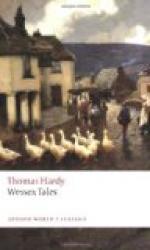Some old earthen camp or barrow, some clump of trees, at least some starved fragment of ancient hedge is usually taken advantage of in the erection of these forlorn dwellings. But, in the present case, such a kind of shelter had been disregarded. Higher Crowstairs, as the house was called, stood quite detached and undefended. The only reason for its precise situation seemed to be the crossing of two footpaths at right angles hard by, which may have crossed there and thus for a good five hundred years. Hence the house was exposed to the elements on all sides. But, though the wind up here blew unmistakably when it did blow, and the rain hit hard whenever it fell, the various weathers of the winter season were not quite so formidable on the coomb as they were imagined to be by dwellers on low ground. The raw rimes were not so pernicious as in the hollows, and the frosts were scarcely so severe. When the shepherd and his family who tenanted the house were pitied for their sufferings from the exposure, they said that upon the whole they were less inconvenienced by ‘wuzzes and flames’ (hoarses and phlegms) than when they had lived by the stream of a snug neighbouring valley.
The night of March 28, 182-, was precisely one of the nights that were wont to call forth these expressions of commiseration. The level rainstorm smote walls, slopes, and hedges like the clothyard shafts of Senlac and Crecy. Such sheep and outdoor animals as had no shelter stood with their buttocks to the winds; while the tails of little birds trying to roost on some scraggy thorn were blown inside-out like umbrellas. The gable-end of the cottage was stained with wet, and the eavesdroppings flapped against the wall. Yet never was commiseration for the shepherd more misplaced. For that cheerful rustic was entertaining a large party in glorification of the christening of his second girl.
The guests had arrived before the rain began to fall, and they were all now assembled in the chief or living room of the dwelling. A glance into the apartment at eight o’clock on this eventful evening would have resulted in the opinion that it was as cosy and comfortable a nook as could be wished for in boisterous weather. The calling of its inhabitant was proclaimed by a number of highly-polished sheep-crooks without stems that were hung ornamentally over the fireplace, the curl of each shining crook varying from the antiquated type engraved in the patriarchal pictures of old family Bibles to the most approved fashion of the last local sheep-fair. The room was lighted by half-a-dozen candles, having wicks only a trifle smaller than the grease which enveloped them, in candlesticks that were never used but at high-days, holy-days, and family feasts. The lights were scattered about the room, two of them standing on the chimney-piece. This position of candles was in itself significant. Candles on the chimney-piece always meant a party.




